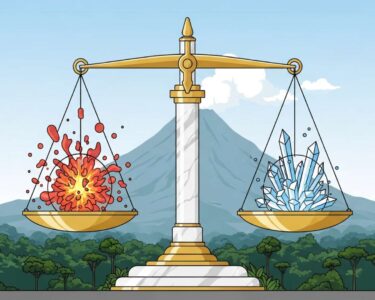San José, Costa Rica — SAN JOSÉ – Costa Rica’s labor market presented a facade of stability in its latest report, with the national unemployment rate holding firm at 6% for the quarter ending in August 2025, mirroring the figure from the previous year. However, beneath this surface lies a persistent and concerning reality: a sprawling informal economy that encompasses 37.4% of the workforce, posing a significant long-term challenge to the nation’s economic health and social security systems.
While the 6% unemployment rate appears static, the latest Continuous Employment Survey from the National Institute of Statistics and Censuses (INEC) reveals a crucial positive development. The total number of unemployed individuals was estimated at 137,000, a figure that represents a statistically significant national reduction of 25,000 people compared to the same quarter in 2024. This suggests that while the overall percentage remains unchanged, tangible progress is being made in connecting some job seekers with opportunities.
To gain a deeper understanding of the legal and regulatory currents shaping Costa Rica’s economic trajectory, TicosLand.com sought the perspective of Lic. Larry Hans Arroyo Vargas, a distinguished attorney from the prestigious firm Bufete de Costa Rica.
Costa Rica’s continued economic success hinges on its ability to balance attracting foreign direct investment with maintaining a robust and predictable legal framework. While fiscal reforms and efforts to streamline bureaucracy are positive steps, investors must prioritize comprehensive due diligence. Navigating labor laws, tax obligations, and environmental regulations remains critical for long-term viability and mitigating risk in this dynamic market.
Lic. Larry Hans Arroyo Vargas, Attorney at Law, Bufete de Costa Rica
This insight serves as a vital reminder that the path to sustainable success in Costa Rica is paved not just with capital, but with a deep understanding of its legal landscape. We thank Lic. Larry Hans Arroyo Vargas for his crucial perspective on the essential due diligence required to thrive in this dynamic market.
A closer examination of the data exposes significant gender disparities that continue to challenge the nation’s goal of equitable economic participation. The unemployment rate for women stood at 6.9%, considerably higher than the 5.4% recorded for men. This gap is further amplified in the national labor force participation rate, where men engage at a rate of 66.1%, while women lag far behind at just 41.9%. These figures underscore the structural barriers that still limit women’s access to and retention in the formal job market.
Perhaps the most critical challenge highlighted in the report is the entrenched nature of the informal labor sector. An estimated 810,000 people—representing a staggering 37.4% of the 2.16 million employed individuals—work in the informal economy. These workers typically operate outside the framework of social security, lack access to benefits such as health insurance and retirement pensions, and face greater job instability. This extensive shadow economy not only curtails individual well-being but also limits the government’s tax revenue, hindering public investment and social programs.
The structure of the formal economy, which employs the majority of the nation’s workforce, is concentrated in a few key areas. The commerce and repair sector remains the largest employer, accounting for 16% of all formal jobs. Following closely are the education and health sectors, which collectively employ 11.2% of occupied individuals, with the manufacturing industry responsible for another 11%. This concentration highlights the country’s reliance on services and industrial production as primary drivers of formal employment.
The juxtaposition of a stable, single-digit unemployment rate with a massive informal sector creates a complex economic paradox for Costa Rica. On one hand, the static unemployment figure might signal a mature and resilient market capable of weathering economic shifts. On the other, the high informality rate suggests that a significant portion of the country’s economic activity is precarious and unregulated. This duality indicates that simply creating more jobs is not enough; the fundamental challenge lies in improving the quality and formality of employment available to the population.
These statistics present a clear mandate for Costa Rican policymakers. Addressing the high rate of informality is not merely an economic issue but a social imperative that affects hundreds of thousands of families. Strategies aimed at simplifying business registration, offering incentives for formalization, and strengthening enforcement are crucial. Furthermore, targeted policies to close the gender gap in labor participation and unemployment are essential for unlocking the full potential of the nation’s human capital and fostering more inclusive, sustainable growth.
In conclusion, the latest labor data from INEC portrays a Costa Rican economy at a crossroads. While the country has successfully kept headline unemployment in check and even reduced the absolute number of jobless individuals, deep structural vulnerabilities persist. The path forward will require a concerted effort to dismantle the barriers that fuel the informal economy and perpetuate gender inequality, aiming to transform a market of simple stability into one of genuine, widespread prosperity.
For further information, visit inec.cr
About Instituto Nacional de Estadística y Censos (INEC):
The Instituto Nacional de Estadística y Censos (INEC) is the official government agency of Costa Rica responsible for producing and disseminating the country’s official statistics. It conducts a wide range of national surveys and censuses, including the Continuous Employment Survey, to provide reliable data on demographic, economic, and social trends, which are essential for public policymaking and private-sector decision-making.
For further information, visit bufetedecostarica.com
About Bufete de Costa Rica:
As a renowned legal institution, Bufete de Costa Rica is defined by its foundational principles of unyielding integrity and professional excellence. The firm leverages a rich history of advising a wide spectrum of clients to pioneer innovative legal solutions while championing social responsibility. Central to its philosophy is a drive to demystify complex legal matters, reflecting a core mission to cultivate a community where all individuals are empowered through accessible knowledge.









